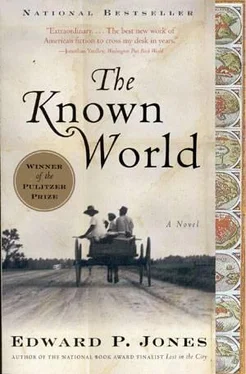The doctor quarantined the place and it wasn’t long before word spread throughout the region that “A Child’s Dream,” as Belle had christened the plantation, was falling to pieces. The man from the bank, fearing that his employer would make him go out to Counsel’s even with the quarantine, quit his job.
By the time Manfred Carlyle had been home four weeks with his family, more than half of the slaves on Counsel’s plantation had died, some twenty-one human beings, ranging in age from nine months to forty-nine years; that number included one-year-old Becky, who was teething but whose mother had nursed her as often as she could with the hope that the disease would pass on by her child; seventeen-year-old Nancy, who was days from marrying a man she thought she loved, a man with enough muscles for two men; thirty-nine-year-old-Essie, who had just committed adultery for the eighth time; and twenty-nine-year-old Torry, who had a harelip but who had four days before he died swallowed whole two raw chicken gizzards, having been told by a root worker that they would cure his “affliction.” Then, after those slaves perished, Darr’s wife died, and so did three of their children. Ten more slaves died, and that same day the first of Counsel’s children died, the oldest girl, freckle-faced Laura, who played the piano so well. In the three days that followed her death the disease swept up nearly all the rest of them, down to the youngest slave, ten-week-old Paula, whose mother had died in childbirth. Only Counsel remained, as healthy as the rainy evening his mother gave birth to him.
The animals would live, too, managing somehow to get by even with all their caregivers dead. The creditors, weeks and weeks later, would not get much for livestock from a place God had turned his back on. A buyer’s place might be next if he bought a cow or a horse; if God could do that to Counsel Skiffington, one potential buyer noted, then what all would he do to poor me?
In the end, after Counsel had tried to drive the animals away, there was not much more than the land, and even that, more than a year later when creditors and others were brave enough to go on it, would be sold for a little less than 45 percent of what it was worth. Belle was the penultimate person to die, just hours before a slave, fifty-three-year-old Alba, wandered in delirium away from his cabin and sat down to death in front of Carlyle’s airing-out cottage. With Belle’s death, Counsel burned down the mansion. From the first death he had buried no one and all the people in his family, including the bodies of nine servants, were burned along with the building. He then went to the cottage where Carlyle had stayed and Darr’s place, and he burned those structures down. The barns. The smokehouse. The blacksmith shop. Everything was burned to the ground. The cabins of the slaves, many with the bodies of the dead still in them, resisted the fire and most of them stayed up, scorched but ready for more tenants. The mud and cheap brick structures would be standing when the first creditor’s accountant arrived to see what he had to deal with. Eight months later, in Georgia, Counsel would take note of a two-door cabin built for two slave families, and it would come to him that the cabins on his land stayed up because they, like the two-door place, had close to nothing in them. Even God’s mansion would burn easily if there were a piano in the parlor and 300 books in the library from floor to ceiling and wooden furniture that came from England and France and worlds beyond.
The crops would escape the fire and would thrive, tended by no one. The fields had not had such bounty in more than seven years. There would be no harvest in the usual sense, as no one came to reap what the slaves had sown. Had someone counted up what crops the fields had to give, it would have come to more than $325 a slave.
The fire at A Child’s Dream burned for three days. Counsel left that second day, heavy with all the sorrow he would ever know, and went west in the county and then south, avoiding all human beings as best he could. He did not care, but it occurred to him in South Carolina that what he had done was a crime, since much of what he had belonged to others. He continued on, aimless, saddled with the memories of his loved ones and the end of a plantation that even men in Washington, D.C., knew about. He had kin in South Carolina, and Belle had people in Georgia, on the coast, but he decided not to go to those towns. Who could understand what had happened to him? And he had the cousin he had grown up with in Manchester County, Virginia, but he had always had so much more than John Skiffington had and Counsel had never missed a chance to let John know that. He could not see himself standing on John’s doorstep, penniless, even though he sensed that John would have held his arms open wide and given him all he had. So he rode on, not even knowing that he just wanted some peace, and not knowing, until much later, that he wanted back all that he had lost.
About three months after he left his plantation, Counsel came to Chattahoochee, Georgia, south of Columbus, thinking that he was far enough away from the coast where some of Belle’s relatives lived. He had ridden nearly every day except for a two-week stretch in Estill, South Carolina, where a rough cold had put him on his back. It was like no other cold he had ever had and he suspected that it was more, that the smallpox he was not even trying to outrun had finally caught up with him. He had brought some money from North Carolina and that afforded a place in a back room at an old couple’s boardinghouse. He paid for a week’s stay, thinking that by the end of that week, he would be dead. The old woman may have suspected what was in mind because she told him, on the third day as she fed him, that no one had ever died in her house and he would not be the first. He recovered and left their place in the night, taking the horse and the saddle that he had given them.
In Chattahoochee, a month after leaving Estill, illness found him again, just as he had hired himself to a man with a large-sized farm. The man had no slaves, only free Negroes he hired when he needed them. Counsel found himself strangely uncomfortable around blacks who toiled but were not slaves, people who came and went as they pleased. He said nothing, needing the money to be able to push on. He worked three days and then collapsed on the fourth day. “I am dying and there is nothing to be done,” he said to the Negroes and the white farmer as they carried him from the field. “Then we’ll find a place for you out yonder,” the white man said, pointing to a cemetery that Counsel had passed by his first day there. He stayed in the room in the white man’s house and was attended to mostly by Matilda, the black woman who cooked and cleaned for them. If she knew how to talk, she never said a word to him, not even good morning, not even good night. He began to recover, slowly, and day by day he cursed God for playing with him. “Make up your mind,” he said to God. “I don’t mind dying. I just want you to make up your mind.”
Late one night, three weeks after he took ill, he waited until all were asleep in the house and took money from a desk in the man’s parlor and saddled one of the man’s horses and left. He wanted to go to Alabama and eventually make it to California. He knew nothing about California, only that it was very far from North Carolina. In November, in Carthage, Mississippi, he bought a pistol to replace the one he had not been able to find in the dark in the Estill farmhouse. That 1840 Allen pepperbox had belonged to his father and all through Alabama he had thought he might go back to the farmer and return the money so he would not have to be without his father’s pistol. But so much more that had been his father’s had been burned up in North Carolina and he realized, nearing Carthage, how foolish it was to dwell on a mere gun.
Читать дальше












